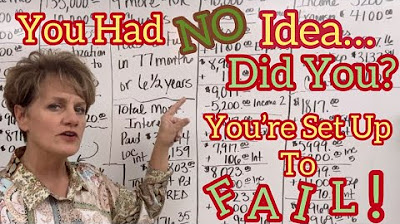Income NEEDED For Millennials and Gen Z To QUALIFY For A 450k House With A 6% Rate
Summary
TLDRThis video script discusses the financial implications of a $450,000 mortgage with a 6% interest rate. It calculates that a 10% down payment and closing costs amount to $60,000 upfront. Monthly payments, including taxes and insurance, would be around $3,200. To qualify for such a loan, one needs a salary of about $100,000 with no existing debt, or $130,000 if they have $1,000 in monthly debt obligations. The speaker advises earning $150,000 to $175,000 annually to comfortably afford the house without becoming 'house poor.'
Takeaways
- 🏠 Purchasing a $450,000 house requires a 10% down payment of $45,000 plus closing costs of about $15,000, totaling $60,000 upfront.
- 📉 With mortgage rates at 6%, the monthly cost for a $450,000 mortgage, including principal, interest, property taxes, homeowner's insurance, and private mortgage insurance, is approximately $3,200.
- 💼 To qualify for this loan, you should ideally earn around $100,000 annually with no existing debt.
- 📈 If you have additional monthly payments like student loans, credit cards, or a car payment totaling about $1,000, you would need a salary of around $130,000 to qualify.
- 💡 It's recommended to earn between $150,000 to $175,000 annually to comfortably afford a $450,000 house at 6% interest rate, avoiding 'house poor' situations.
- 🔍 Mortgage rates are expected to decrease soon, potentially reaching 6%, which would affect the monthly mortgage cost.
- 🏦 The calculation assumes a combined cost for property taxes, homeowner's insurance, and private mortgage insurance of $200 per month.
- 📊 The script emphasizes the importance of not only qualifying for a loan but also ensuring that the house remains a pleasure rather than a financial burden.
- 💼 The script suggests that even if one qualifies for a loan based on income, it's crucial to consider the overall financial health and other monthly obligations.
- 🏡 The discussion highlights the total cost of homeownership beyond just the mortgage payment, including taxes and insurance, which are essential for a realistic assessment of affordability.
Q & A
What is the current mortgage rate mentioned in the script?
-The current mortgage rate mentioned in the script is 6.2%, with an expectation that it might soon hit 6%.
How much is the down payment for a $450,000 house if you put down 10%?
-The down payment for a $450,000 house when putting down 10% would be $45,000.
What are the estimated closing costs for the house mentioned in the script?
-The estimated closing costs for the house are about $15,000.
How much cash is required upfront to buy the house as described in the script?
-The total cash required upfront, including the down payment and closing costs, is $60,000.
What would be the monthly cost of a $450,000 mortgage at a 6% interest rate?
-At a 6% interest rate, the monthly cost of a $450,000 mortgage would be approximately $3,200, including principal, interest, property taxes, homeowner's insurance, and private mortgage insurance.
What is the minimum annual salary required to qualify for the loan without any other debt?
-To qualify for the loan without any other debt, one would need to earn about $100,000 annually.
If you have existing monthly payments like student loans or credit cards totaling $1,000, what salary is recommended to qualify for the loan?
-If you have existing monthly payments totaling $1,000, you would need an annual salary of about $130,000 to qualify for the loan.
What is the recommended annual salary to comfortably afford a $450,000 house at the current mortgage rate?
-The script recommends earning about $150,000 to $175,000 a year to afford a $450,000 house at the current mortgage rate without being 'house poor'.
What does 'house poor' mean in the context of the script?
-In the context of the script, 'house poor' refers to a situation where a significant portion of one's income is consumed by housing costs, leaving little for other expenses or savings.
Why is it important to consider more than just qualifying for the loan when buying a house?
-It is important to consider more than just qualifying for the loan because it ensures that you can comfortably afford the house without overextending your budget, which can lead to financial strain and a reduced quality of life.
Outlines

このセクションは有料ユーザー限定です。 アクセスするには、アップグレードをお願いします。
今すぐアップグレードMindmap

このセクションは有料ユーザー限定です。 アクセスするには、アップグレードをお願いします。
今すぐアップグレードKeywords

このセクションは有料ユーザー限定です。 アクセスするには、アップグレードをお願いします。
今すぐアップグレードHighlights

このセクションは有料ユーザー限定です。 アクセスするには、アップグレードをお願いします。
今すぐアップグレードTranscripts

このセクションは有料ユーザー限定です。 アクセスするには、アップグレードをお願いします。
今すぐアップグレード5.0 / 5 (0 votes)






